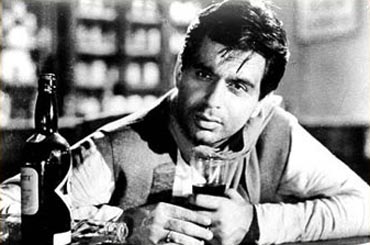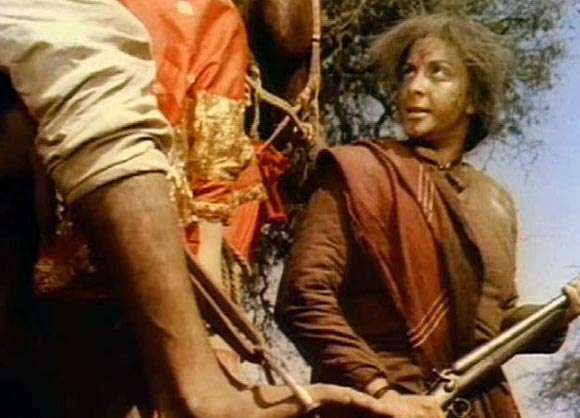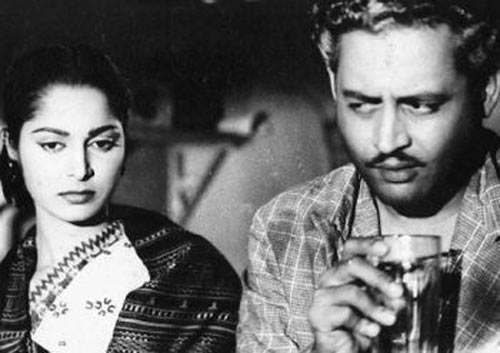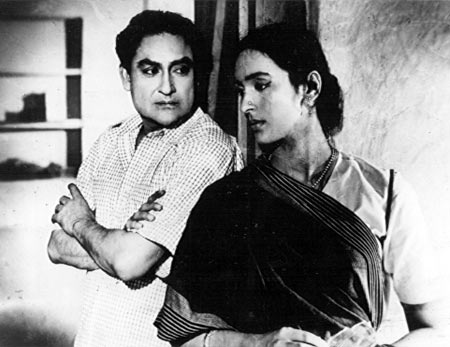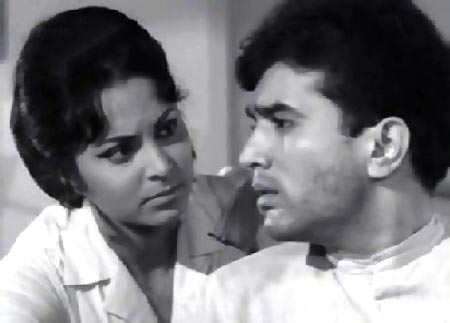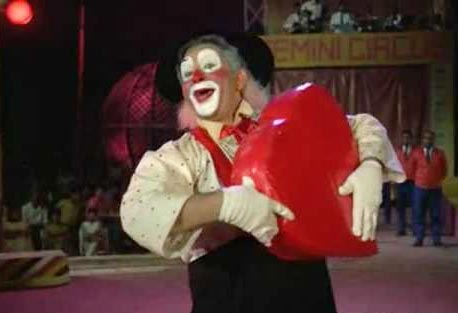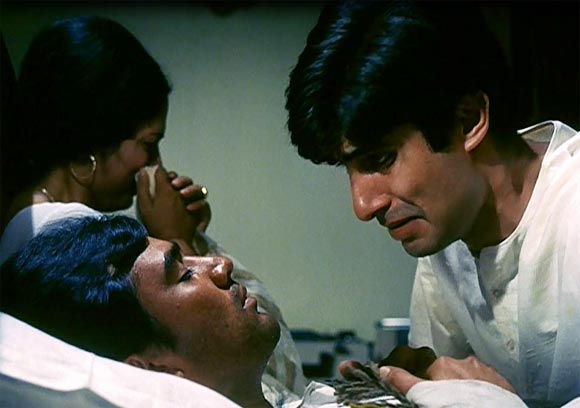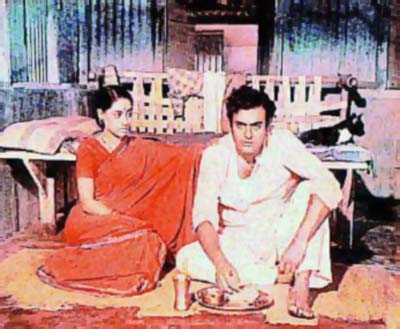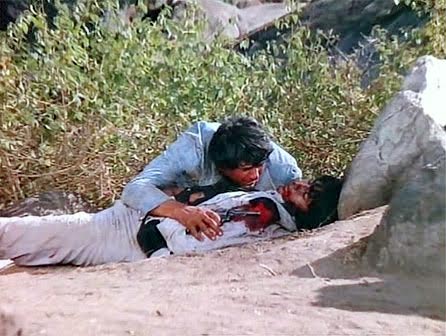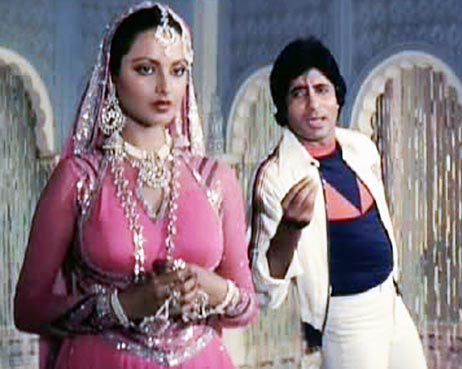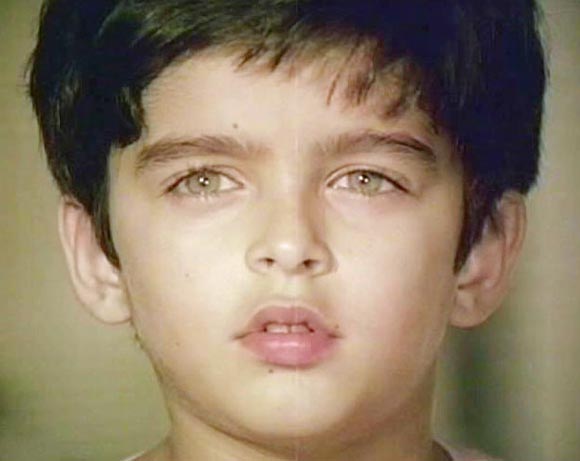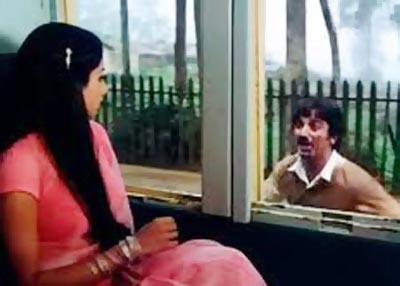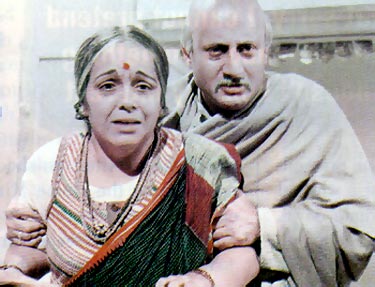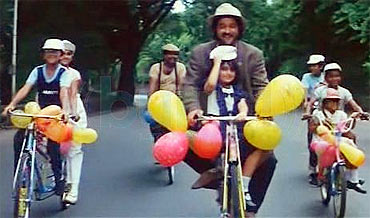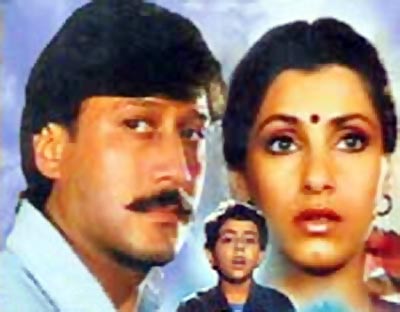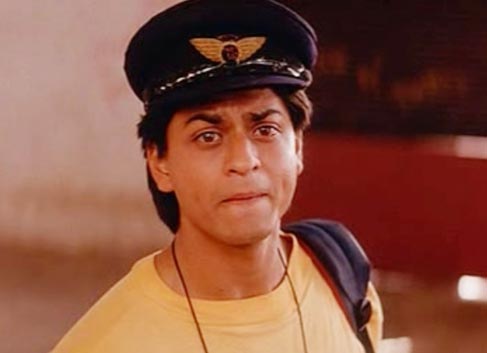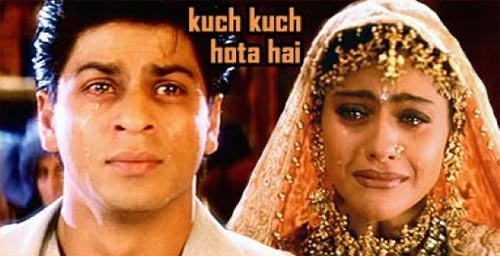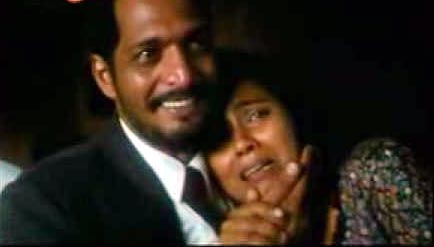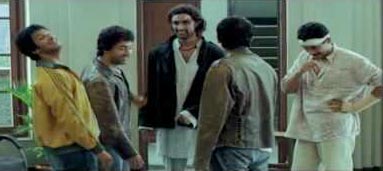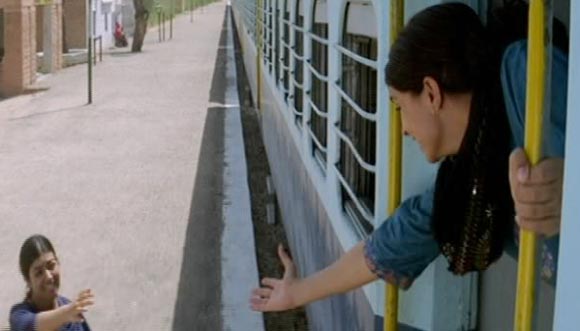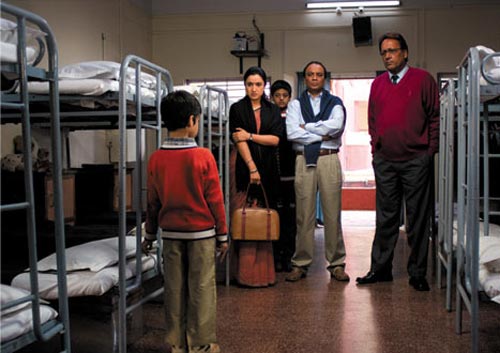 | « Back to article | Print this article |
Top 25 Bollywood Scenes That Made Us Cry
Cinema has the incredible power to dictate our emotions. Moreover, like the great Charles Dickens once said, 'We need never be ashamed of our tears.'
And so when a viewer connects with a character or his/her situation, its absolute misery and unfairness, tears well up in the eyes as a sign of support and sentiment, equivalent to an off-screen hug, soothing pat or comforting 'Don't worry.'
This is the closest you and I come to reaching out to some of the most heartbreaking moments in the movies. Since their fate is in the scriptwriter's hands alone, we choose to suffer by joining in the pain.
Here then is a look at 25 of Hindi cinema's saddest scenes. Hit the message board to post the ones that made you all blue.
Devdas
There was never going to be a happy ending to this one. One's arrogance, another's self respect leads to a fate neither Dev nor Paro had bargained for.
Bimal Roy's deft reproduction of Sarat Chandra Chattopadhyay's novel and Dilip Kumar's overwhelming portrayal lends the alcoholic icon a tragic end but glorious place in the realm of cinema.
The scene where he breathes his last outside Paro's doorstep and the latter's horrific discovery of the same is written in such bleak taste, it unfailingly hurts.
Mother India
After facing a lifetime of difficulties, Nargis faces the final test of her unyielding moral stand after her bandit son (played by Sunil Dutt) threatens to abduct a village girl from her marriage procession.
Choosing integrity over blood, she fires a bullet into her misguided son to become a shining but tragic example that earns her title of Mother India in Mehboob Khan's unforgettable epic.
Kagaz Ke Phool
'Kagaz ke phool jahan khilte hain, baith na un gulzaron main.'
Melancholy was the heartbeat of most of Guru Dutt's celebrated works. His delicate, artistic temperament never quite came to terms with the ruthless workings of the film industry.
Kagaz Ke Phool resonates it flawlessly in the scene where a once glorious filmmaker who gave a break to a rank newcomer is reduced to playing a disguised extra in her comeback film, evokes both -- awe and sighs.
Bandini
Bimal Roy's Bandini scratches the surface of intense devotion to expose its grey zone while retaining the humanity within his protagonists.
Nutan goes through a lot of trials and tribulations to be with the man she loves, Ashok Kumar.
And even when life offers her a second chance as an alternative over the seemingly hopeless, Nutan picks the less glamorous option allowing her heart to dictate her head in the exquisitely picturised bittersweet scene with the SD Burman touch -- Main Bandini Piya Ki. Main Sangini Hoon Saajan Ki.
Saheb Biwi Aur Ghulam
In Guru Dutt's haunting classic, Meena Kumari plays a mighty zamindar's neglected wife doing everything in her capacity to get the significant other's attention. And even though it's a taboo for that era, she takes up drinking but absolutely nothing works.
Her pathetic attempts give rise to some of the saddest scenes depicting the plight and subjugation of women in the male-dominated society of 19th century India.
Khamoshi
Unable to draw the distinction between illusion and reality proves grievous for Waheeda Rahman in Asit Sen's lyrical black and white classic, Khamoshi.
Rahman plays an asylum nurse who gets her heart broken when her genuineness is misconstrued as pretense by a rehabilitated patient (Dharmendra).
She extends the same warmth on another (Rajesh Khanna) but by the end of it cannot withstand the strain of her own pent-up feelings resulting in a tragic reversal. The outcome is a sensitive moment when Lalita Pawar calls out for patient number 24, none other than Rahman herself.
Mera Naam Joker
Minutes after losing his mother, who almost immediately dies of a heart attack after witnessing her son's performance as a circus clown (of which she always vehemently disapproved), Raj Kapoor's Raju is called upon to finish his part of the set.
The ruthless facet of the 'show must go on' maxim comes to light when an understandably upset RK pitifully mourns 'Maa, Maa' in the middle of his act.
Anand
The fate of Hrishikesh Mukherjee's terminally-ill titular creation is never a secret.
Yet all through the film, Rajesh Khanna draws us in with his zest for life and effervescent ideology, we conveniently forget how it all promised to end.
And so his final moments, wherein he succumbs to this inevitability with poetic grace (Maut tu ek kavita hai) followed by an emotional outburst of Anand's physician and pal Amitabh 'Babumoshai' Bachchan's make it especially painful.
Koshish
Often films about physical challenges tend to be on the emotionally manipulative side.
But Gulzar's filmmaking aesthetics boosted by naturally gifted talents like Sanjeev Kumar and Jaya Bachchan ensure Koshish tells a heartfelt story of a deaf-mute couple.
A truly dark moment arrives on a rainy night when Asrani sneaks in the two's home to steal and dumps their crying tot on the floor.
Unable to hear their baby's cry or the thundering storm, the couple blissfully sleeps while their child crawls outside the house only to be washed by the cruel downpour.
Sholay
Sorry Basanti, but Jai and Veeru's jodi is the only one that matters.
And so it's really tragic when an injured Jai (Amitabh Bachchan) uses his deceitful toss coin to buy Veeru (Dharmendra) and Basanti (Hema Malini) enough time for escape.
Out of ammunition, outnumbered, Jai eventually falls and goes on to deliver one of the saddest death scenes of Hindi cinema -- Yeh kahani bhi adhoori reh gai, Veeru.
Heartbreaking stuff, this. Then again, this holds true for nearly all of Big B's dying scenes from Deewar and Shakti to Main Azaad Hoon and Paa.
Muqaddar Ka Sikandar
Quite a few burn their fingers in Prakash Mehra's love quadrangle.
And your heart particularly goes out for Rekha, as the golden-hearted prostitute harboring unconditional love for Bachchan, forced to take her life by tasting a pure diamond in order to keep her promise to the latter's best friend, Vinod Khanna.
All the more annoying since VK already stole AB's original girl, Raakhee.
Masoom
Even after nearly three decades, the poignant notes of Masoom haven't lost their touch.
While there are a lot of films about the 'other woman' and the setback it causes to a marriage, Masoom tries to see itself through the perspective of the 'other child' unwittingly caught in middle of an marital upheaval.
There's much to shed a tear about when Jugal Hansraj's aching blue eyes acknowledge he knows the truth. That his beloved father figure is, in fact, his father:
'Mujhe maloom hai...ke woh mere papa hain. Chitthi mein likha hai.' And then, not knowing how else to deal with such humiliation and denial, simply hides his face in the wall and cries like only an eight-year-old can.
Sadma
The climax of Sadma is so unbelievably grim, it's alright if you refuse to sit through it.
Validating the title of this Balu Mahendra classic that features milestone performances from its leads -- Kamal Hasaan and Sridevi -- Sadma is about how a young man goes out of his way to restore a troubled girl back to normalcy.
Together, the odd couple forms a precious bond, which is tragically shattered after she is cured and no longer holds any memory of her savior.
Kamal Haasan's despair and desperation when he confronts her at the railway platform while Sri mistakes him for a crazy beggar, yes, time to bring the hankies out.
Saraansh
Mahesh Bhatt's stunning Saaransh introduced us to the hard-hitting conviction of an actor named Anupam Kher. In this film, Kher, still in his late 20s, played the role of a senior citizen coping with life after the demise of his only son.
'TV lene nahi aaya hoon. Main apne mare hue bete ki asthiyan lene aaya hoon,' he pleads to the painfully incompetent bureaucratic procedure of the country.
Shaken by his outburst, the latter apologises for his discourtesy.
Mr India
When Tina -- the youngest and most favoured kid of Mr India's orphan bunch -- gets bumped off in a bomb blast; the otherwise fun-filled family fantasy hits its most despondent note.
Khelte, khelte ek titli najane kahan kho gayi, hums a voice in the background, as Anil Kapoor, Sridevi and all her little friends gather around her grave to say their final goodbyes in a scene reminiscent of Disney's Snow White and the Seven Dwarfs.
Kaash
Films involving a child suffering from cancer or ilk are designed to create a lump in the throat.
Bhatt's Kaash has an additional subplot of a failed superstar, failed husband working towards becoming an understanding father even as he and his wife re-connect over this cruel crisis.
Before there was Akele Hum Akele Tum and Paa, Kaash portrayed this feeling of loss and estrangement with some help from Jackie Shroff and Dimple Kapadia's compelling performances.
Anjali
Kids can turn marshmallows out of the best of us. Mani Ratnam's Anjali, even in its dubbed avatar, reaffirms just that.
The little girl, despite her delicate physical and psychological condition, charms her way through.
Especially touching is her innocent interaction with her erstwhile resistant-turned-staunchly protective siblings and the equally supportive colony kids.
Kabhi Haan Kabhi Naa
Easily one of Shah Rukh Khan's best performances, if not the best, Kundan Shah's frothy slice of life, like the title suggests, about life and its ups and downs.
SRK's Sunil is effortlessly adorable and easily gains audience sympathy every time his poor heart gets punctured by dream girl, Anna, since she's in love with someone else.
But when it truly hits him, she's just not into him; our man pours his sorrow in the sounds of sea and saxophone in a rather aww-inducing sequence.
Kuch Kuch Hota Hai
Karan Johar's directorial debut has quite a few scenes that aim for the tear glands.
But the one where you feel seriously bad is when a tearful Kajol cries out, 'Mera pehla pyaar adhoora reh gaya, Rifat bi,' on discovering her BFF (Shah Rukh Khan) is in love with another girl (Rani Mukerji).
It's Kajol's tender vulnerability and hurtful admission of a universally identifiable moment that makes it so cutting.
Khamoshi: The Musical
Sanjay Leela Bhansali loves to tear up his audience.
His directorial debut, Khamoshi: The Musical about a deaf-mute couple and their musically-inclined daughter has several moments that make you rummage for a tissue box.
But the one that strikes as most effective is when a distraught Nana Patekar attempts to revive his nearly comatose daughter, Manisha Koirala by doing an oft-repeated amusing action of twisting her ear.
And, this time too, she miraculously hangs her tongue out. Sad, strange, touching.
Rang De Basanti
Inspired by Bhagat Singh's rebellion and their close friend's dishonorably treated demise, a bunch of college mates take on corruption and its torchbearers only to be rewarded with an equally brutal fate.
Considering the extent of fun, frolic and friendship exhibited by these characters, the audience settles in comfortably unaware of the nightmarish turn of events in store making its finale all the more bloody and affecting.
Dor
Not all tears are evil, states Gandalf The White in Lord of the Rings Trilogy.
The wizard's sentiments are seconded in Nagesh Kukunoor's superb final scene ends on a heartwarmingly hopeful note when a finally liberated (from the clutches of social customs and traditions) Ayesha Takia rushes to meet Gul Panag at the railway station and hand over her the all-important forgiveness document as well retrieve their valuable friendship.
It's the beginning of something wonderful, sniff.
Swades
You don't have to be a Non Resident Indian to feel the pathos and patriotism in A R Rahman's feverish pitch as he conveys the heartfelt contents of Yeh jo des hai tera.
Among the many visuals it replays is one of SRK in the train wherein the latter buys a glass of water from a young boy for 25 paise at the station.
It's upsetting. It's reality.
Taare Zameen Par
Aamir Khan's exploration on dyslexia and childhood is aimed to tug the heartstrings and moisten eyes.
Being sent to a hostel for his poor performance in school has a drastic impact on Darsheel Safary's sparkle.
The sensitive boy now wears a constantly sullen, scared and dispirited expression even as Shankar-Ehsaan-Loy touching melody articulates his isolation and undeclared attempt to reach out to that warm and wonderful creation called Maa.
Guzaarish
Most heroes appear conscious while crying on big screen. Not Hrithik Roshan. He does that misty eyes thing so well, it's hard not to turn on the waterworks.
Bhansali's Guzaarish, irrespective of how you rate it, rests predominantly on Hrithik's earnest performance as a quadriplegic pleading for euthanasia.
His hypnotic light eyes turns into vessels of agony as his helpless being deals with an attack of inconsiderate raindrops from the leaking rooftop. Your default reaction is to feel bad, of course. Logic hits later, way later.
